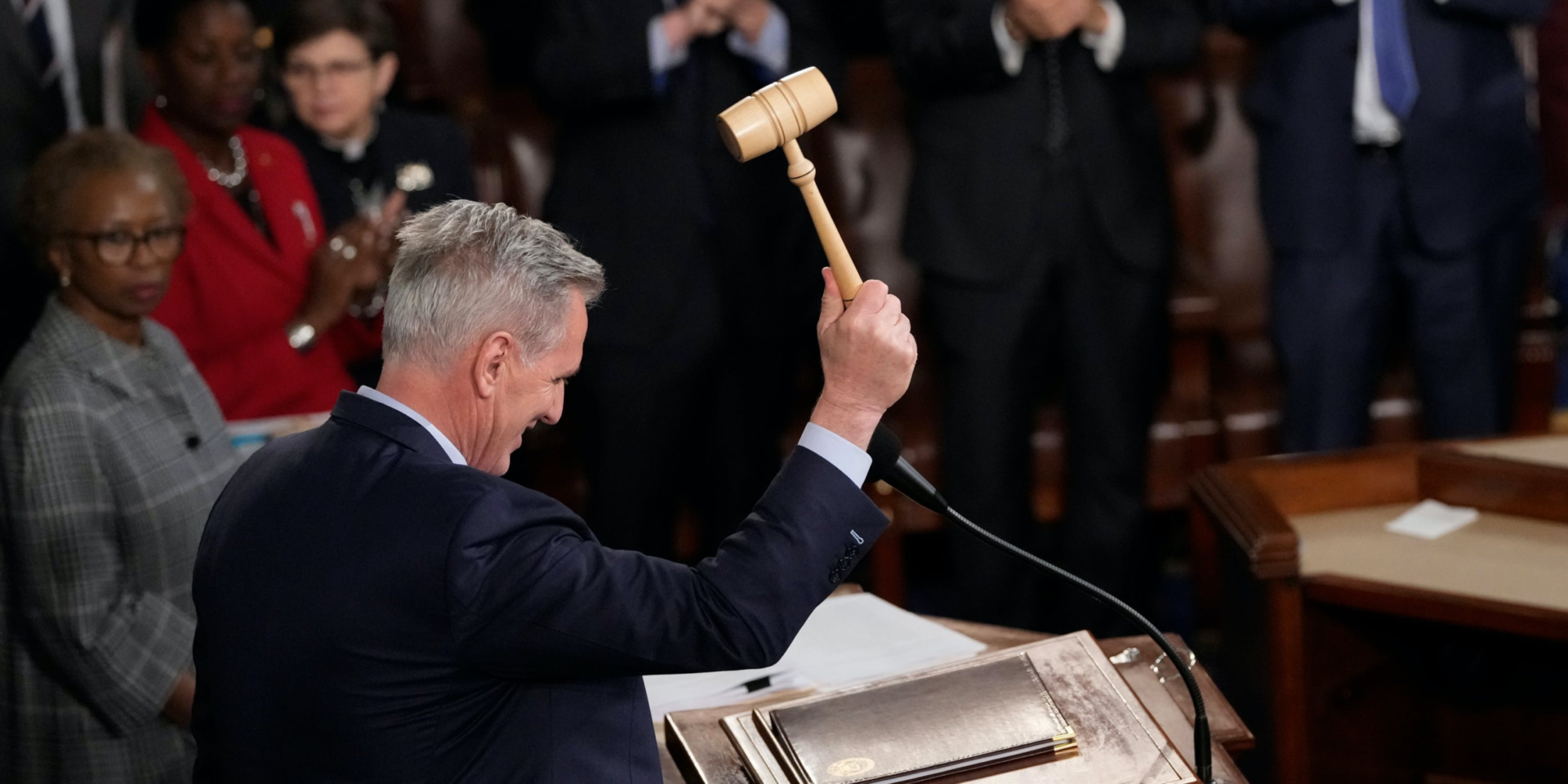House Republicans enacted new rules for the 118th Congress on Monday that preserve the traditional right of rank-and-file members of Congress to bypass House leadership and put legislation on the floor directly if they obtain the signatures of a majority of the chamber. This opens a handful of legislative opportunities for Democrats, despite Republican ideological cohesion.
The maneuver, known as a discharge petition, was famously deployed by President Lyndon Johnson and his House allies to pressure reluctant opponents of civil rights to allow a vote for the Civil Rights Act on the floor. Under standard rules, the majority leader sets the floor schedule, in collaboration with the House Rules Committee, but a discharge petition can automatically pull a bill from committee and move it to the floor. Once the logjam was broken, it passed with significant support.
Rep. Alexandria Ocasio-Cortez, D-N.Y., deployed a discharge petition in the last Congress to pressure House Speaker Nancy Pelosi to move forward with a ban on congressional stock trading. Pelosi smothered the move by publicly agreeing to hold a vote, but then sabotaged negotiations.
With Democrats holding 213 seats in the 118th Congress, that leaves them five votes short of the number needed to bring a bill to the floor. For most legislation, five votes is far too high a hurdle to clear. It is exceedingly unlikely, for instance, that Democrats could find five Republicans to sign on to a discharge petition that created a vote on codifying Roe v. Wade, though there may be a small number of Republicans put in a difficult spot at home if they resisted signing.
A discharge petition to raise or eliminate the debt ceiling, on the other hand, could avert a financial crisis threatened by Freedom Caucus members who opposed Rep. Kevin McCarthy’s bid for the speakership. In exchange for their votes, Freedom Caucus members won a commitment that McCarthy would hold U.S. debt payments hostage in exchange for significant spending cuts across the board. But if Democrats could find five Republicans unwilling to risk default, which would spark a global financial crisis, a discharge petition would give those Republicans a route around their own leadership.
First-term Rep. Chris Deluzio, D-Pa., said that he saw real opportunities for bipartisanship when it comes to antitrust policy, and a discharge petition could get around McCarthy’s support for concentrated corporate power. “I think there’s some interest on their side in doing some of this. There certainly is on ours. If we can get the numbers, fine, we’ll do it, I’ll be part of that,” he said.
Rep. Raúl Grijalva, D-Ariz., said that a similar dynamic might be at play when it comes to immigration — “the desperation on the border,” as he put it — and the fentanyl crisis, if a handful of Republicans in blue districts feel pressure to get something done. “How can you not hear that and give it a fair opportunity,” he said. “If there’s common-sense, middle-ground, enforcement-slash-humanitarian, how can you turn that one down?”
And, of course, the fate of Republican Rep. George Santos of Long Island remains unclear. Santos is currently one of 18 Republicans serving in a district that voted for Joe Biden for president in the 2020 election. If Santos resigns or is booted from office, the question of codifying Roe in the resulting special election would be more salient with an active discharge petition underway, as it would move Democrats one vote closer to a majority.
In November, following the midterm elections, Ocasio-Cortez backed the idea of a discharge petition on abortion rights, though was concerned that Republicans might strip the discharge petition from the rules in the upcoming term. Their opportunity to do so quietly came and went on Monday. Any effort to change the rules in the middle of the term in response to a petition with momentum would at minimum attract national attention.
“Discharge petition is an excellent vehicle,” Ocasio-Cortez said in the interview. “Using rules is going to be quite important. I know that that’s going to be subject to negotiation within the Republican caucus as well. This is something that they’ve already started to use as a lever. … They are in a much weaker position as a party, which means they have more to concede — not us. And we can stand in that confidence, in that power a little bit more.”
David Segal, head of the group Demand Progress, which often works with both Democrats and Republicans on populist issues, said the motion to discharge opened up opportunities to push legislation opposed by party leadership. “Discharge petitions can be used to a variety of useful aims — from forcing members to take stances on popular issues, to potentially forcing votes on matters of important substance where there’s cross-partisan esteem, like antimonopoly policy, that could actually pass,” he said.
Democrats would have to move fairly quickly, however, to avert a financial crisis. First, a bill would have to be introduced and referred to committee, according to House rules and precedents. Then 30 legislative days would need to expire. Once 218 signatures are collected, another seven legislative days need to pass, at which point the motion would come to the floor on the second or fourth Monday after those seven legislative days are up. A legislative day is one in which the House is in session and then adjourns. A motion to discharge filed in February or March ought to be ripe by summer. The Treasury Department has not put a precise date at which default will occur, but the estimate is summer.
Using a discharge petition to avert default could, however, become a moot issue. Constitutional scholars have argued that the debt ceiling itself is unconstitutional: If Congress appropriates money, the executive is required to spend that money, not default because of a lack of borrowing authority when other avenues to fulfill the appropriations exist.




